Events
🇯🇵 🇮🇹 🇫🇷 2024 Ocean Decade Conference
- March 29th
ICONA will be joining OARS (Ocean Acidification Research for Sustainability) at the 2024 Ocean Decade Conference in Barcelona, Spain, 10-12 April 2024 - as part of the Ocean Decade Week.
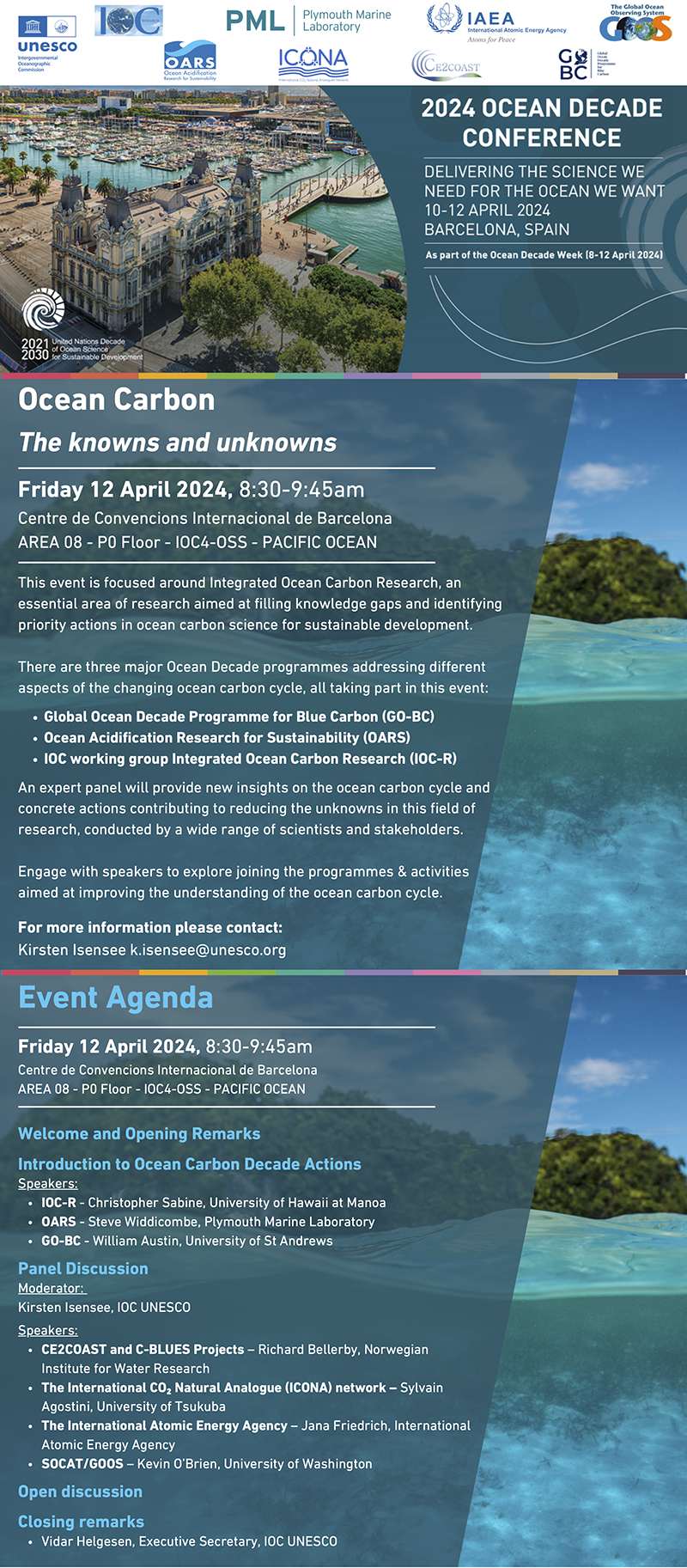
🇫🇷 Nouvelle Caledonie Les super pouvoirs des coraux
- December 28th
Research led by Dr Riccardo Rodolfo-metalpa and Dr Fanny Houlbreque (IRD, New Caledonia) at Bouraké (New Caledonia) was covered on French national TV (TF1). The video was entitled 'Nouvelle Caledonie Les super pouvoirs des coraux' (New Caledonia - The super powers of corals).
This can be viewed here on the TF1 website: https://www.tf1info.fr/podcast/24h-pujadas-les-partis-pris/video-nouvelle-caledonie-les-super-pouvoirs-des-coraux-2281054.html
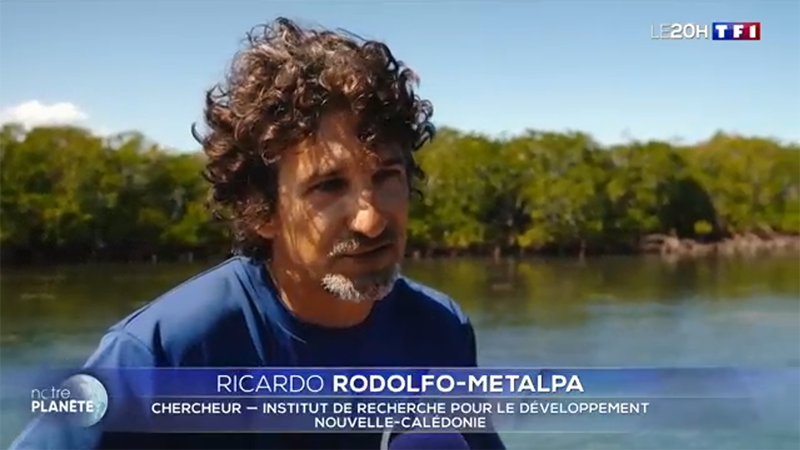
🇯🇵 🇮🇹 Best Presentation Award
- November 25th
Joshua Heitzman, a graduate student in the Agostini laboratory at the Shimoda Marine Research Center (University of Tsukuba), was awarded the Best Student Presentation Award at the 2023 (26th) Annual Meeting of The Japanese Coral Reef Society. His presentation was entitled 'Coral skeleton dissolution is accelerated by turf algal settlement under ocean acidification'. This ICONA research included members from the University of Tsukuba and University of the Ryukyus in Japan, and Stazione Zoologica Anton Dohrn (Palermo) in Italy.
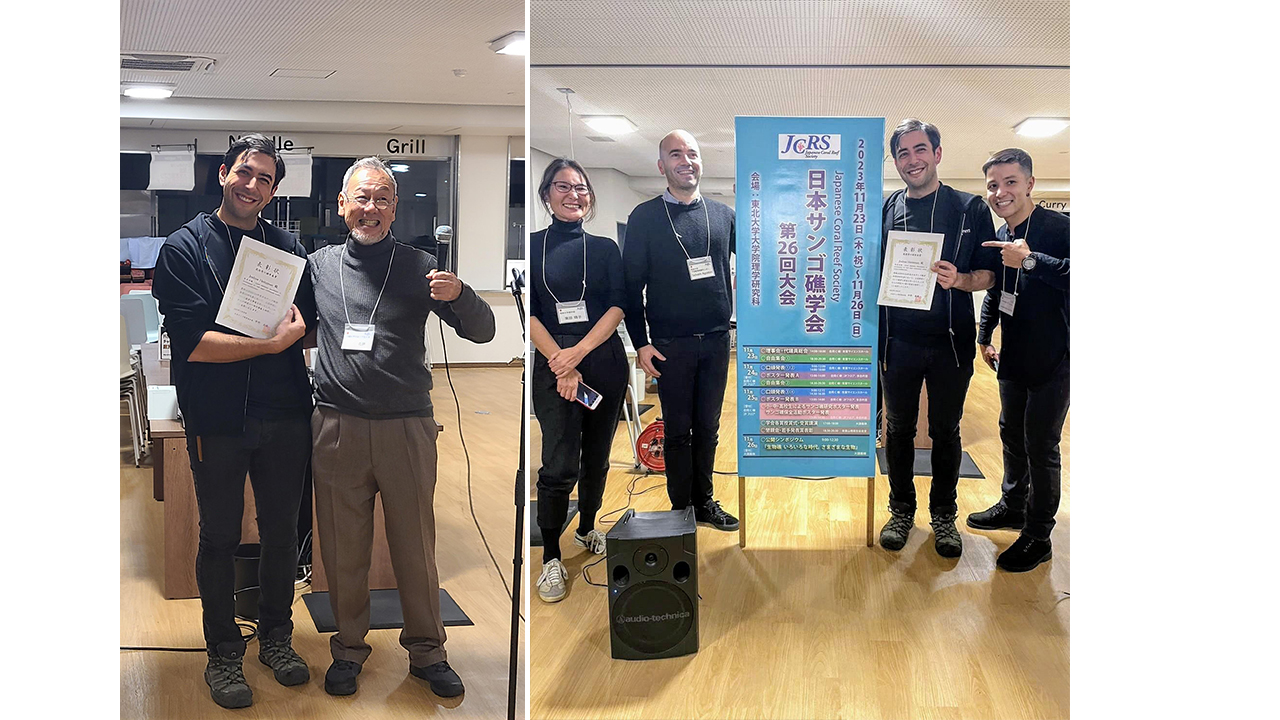
🇯🇵 🇮🇹 🇫🇷 GOA-ON Ocean Acidification Week 2023
- October 30th
ICONA took part in GOA-ON 'Ocean Acidification Week 2023' giving four talks as part of the 'Updates from the ICONA Network' session. Presentations were given by Dr Shigeki Wada (Shimoda Marine Research Center, University of Tsukuba, Japan), Dr Carlo Cattano (Sicily Marine Centre, Stazione Zoologica Anton Dohrn, Italy), and Masters students Ayaka Umeda (University of the Ryukyus, Japan) and Layla Iijima (Shimoda Marine Research Center, University of Tsukuba, Japan). The talks were all great success - Many thanks to both our speakers and the audience.
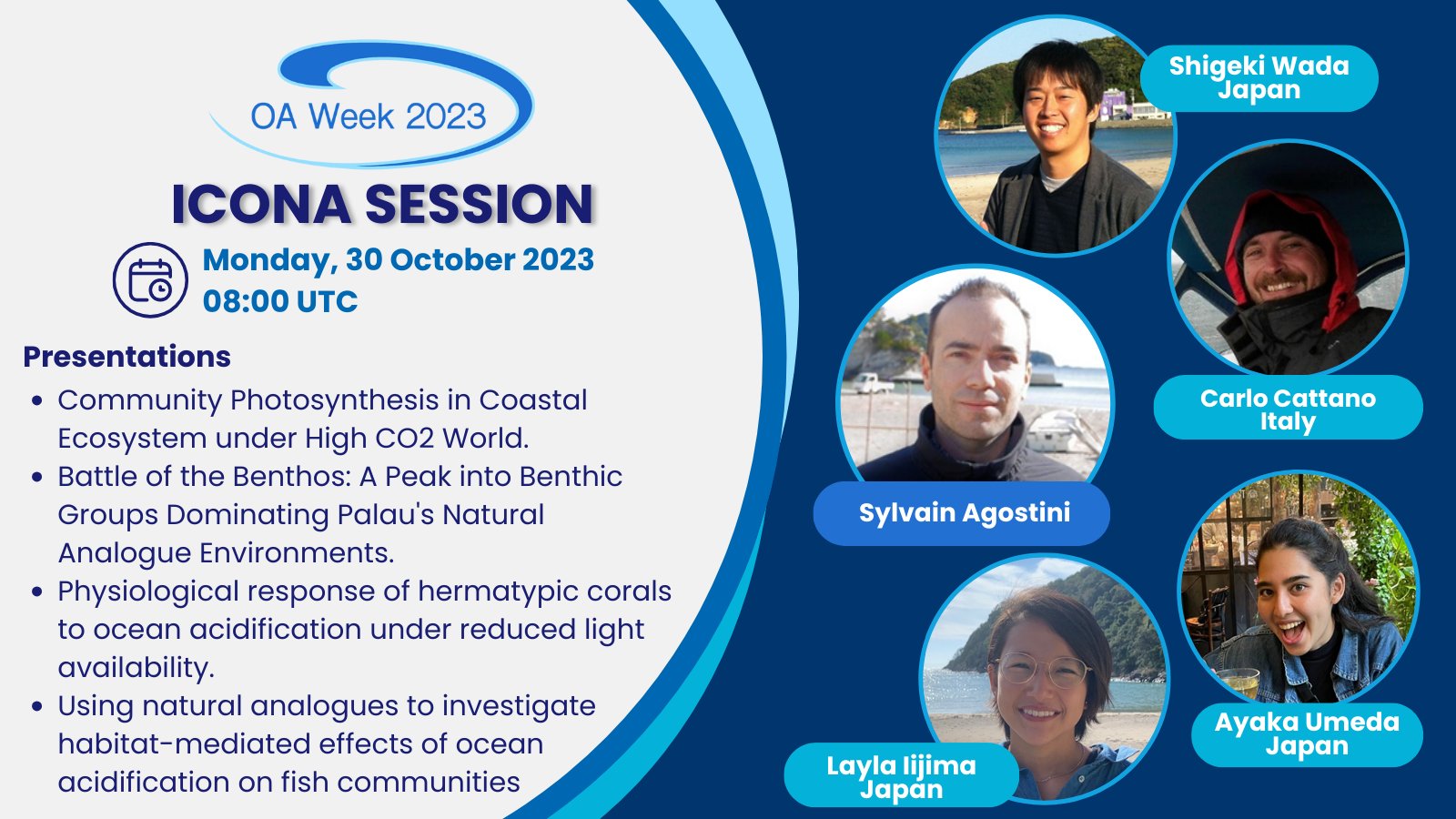
🇯🇵 🇫🇷 Visit to Bouraké
- October 16th - October 19th, 2023
Dr Ben Harvey (Shimoda Marine Research Center, University of Tsukuba, Japan) and PhD Student Callum Hudson (OIST, Japan) visited Bouraké in New Caledonia to investigate the ecological and molecular responses of sea urchins to future carbonate chemistry conditions. They were joined by Dr Christopher Cornwall and PhD students Denisa Berbece and Holly Koch (Victoria University of Wellington, New Zealand) who were investigating the responses of crustose coralline algae. Both teams were hosted by Dr Riccardo Rodolfo-metalpa (IRD, New Caledonia).
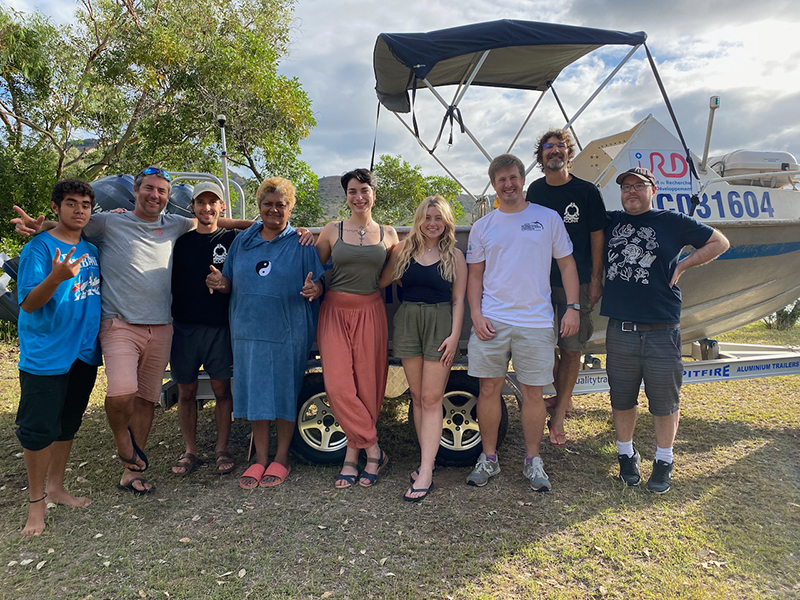
🇯🇵 🇫🇷 Visit to Palau
- September 2nd - September 16th, 2023
The coral and biodiversity teams returned to Palau. The coral team returned to collect their transplanted corals as part of their experiment investigating the combined effects of ocean acidification and light on a range of coral species. The biodiversity team returned to continue their benthic surveys and assessments of the hidden diversity in the Palau marine benthos. The teams included: Dr Riccardo Rodolfo-Metalpa and Dr Fanny Houlbreque (IRD, New Caledonia); Prof. Haruko Kurihara with PhD Student Sherry Lyn Sayco and Masters Student Hiroki Suzaki (University of the Ryukyus), Dr Sylvain Agostini with Masters Student Layla Iijima (Shimoda Marine Research Center, University of Tsukuba, Japan), Post-doctoral Researcher Dr Fabian Gösser and Masters Student Ayaka Umeda (University of the Ryukyus, Japan), and Dr Tom Shlesinger (Tel Aviv University & The Steinhardt Museum of Natural History, Israel).
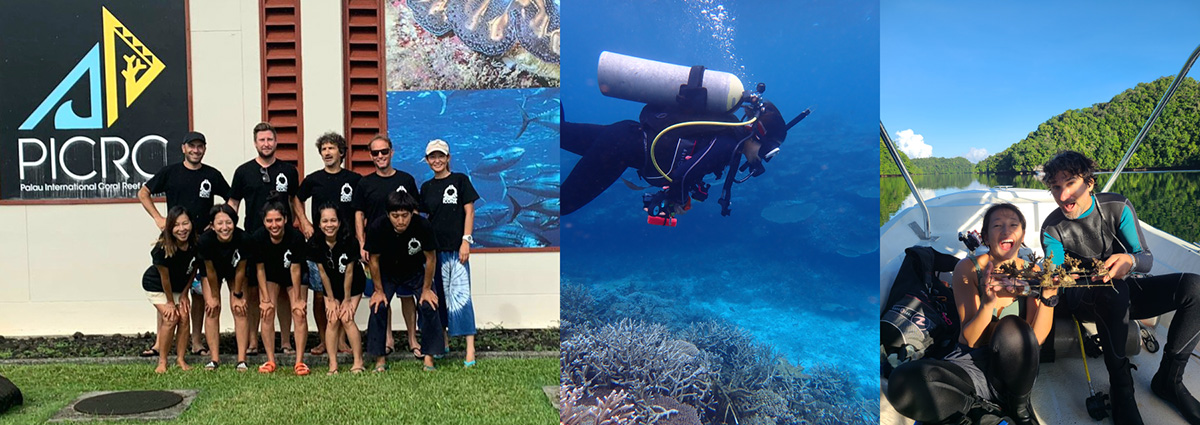
🇯🇵 Visit to Shikine
- June 5th - June 9th, 2023
A team from the University of Adelaide, Australia, lead by Professor Ivan Nagelkerken are visiting the Shikine CO2 seep (hosted by Dr Ben Harvey, Shimoda Marine Research Center, University of Tsukuba, Japan), to investigate the effects of ocean acidification on food-web structure, as well as the physiological response of fishes.

🇯🇵 🇮🇹 🇫🇷 Expedition to Palau: Science Presentation
- April 17th - April 28th, 2023
During our visit to the Palau International Coral Reef Center, we were given the opportunity to give a presentation about the ICONA network and our research in Palau.
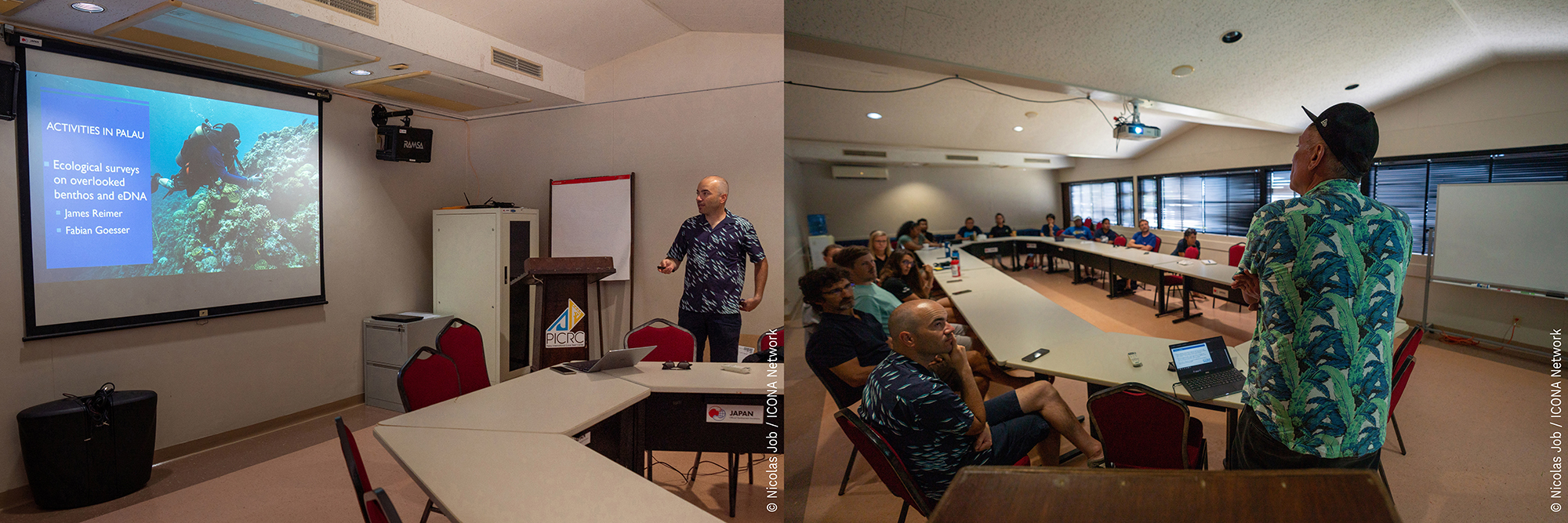
🇯🇵 🇮🇹 🇫🇷 Expedition to Palau: Media
- April 17th - April 28th, 2023
Photographs and videography during the Palau expedition was provided by Nicolas Job (https://www.nicolasjob.com/).
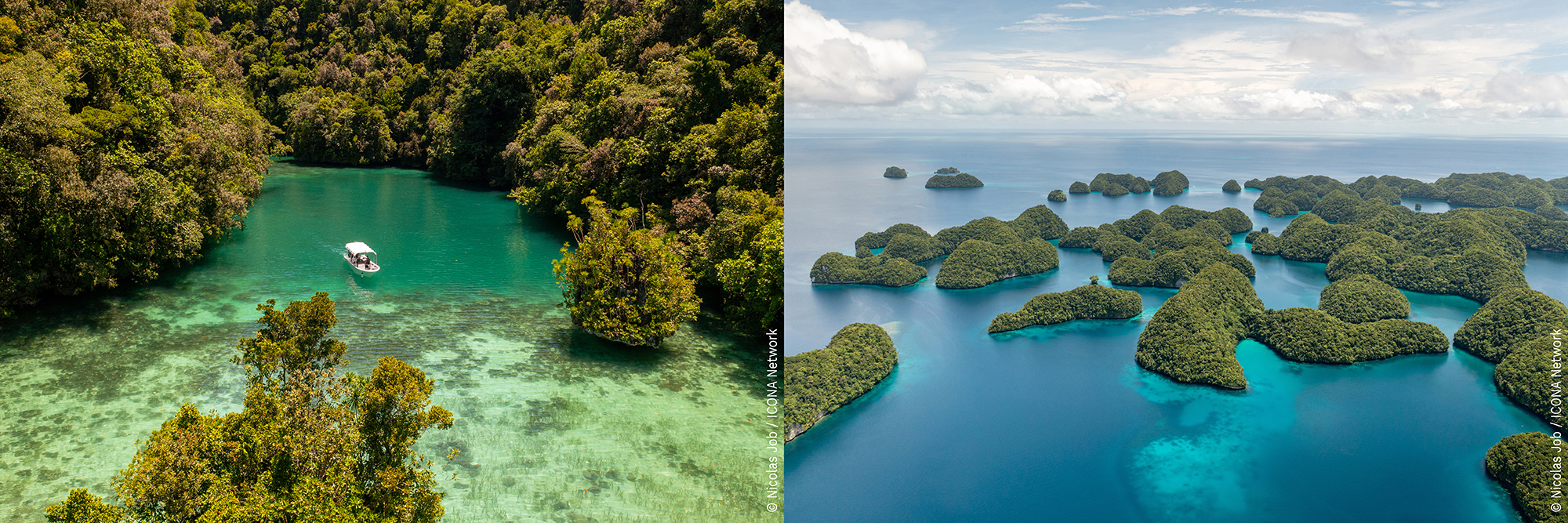
🇯🇵 🇮🇹 🇫🇷 Expedition to Palau: Biodiversity
- April 17th - April 28th, 2023
The biodiversity team investigated changes in biodiversity through visual surveys, sampling and eDNA approaches. The team included Professor James Reimer and post-doctoral Researcher Fabian Gösser (University of the Ryukyus, Japan).
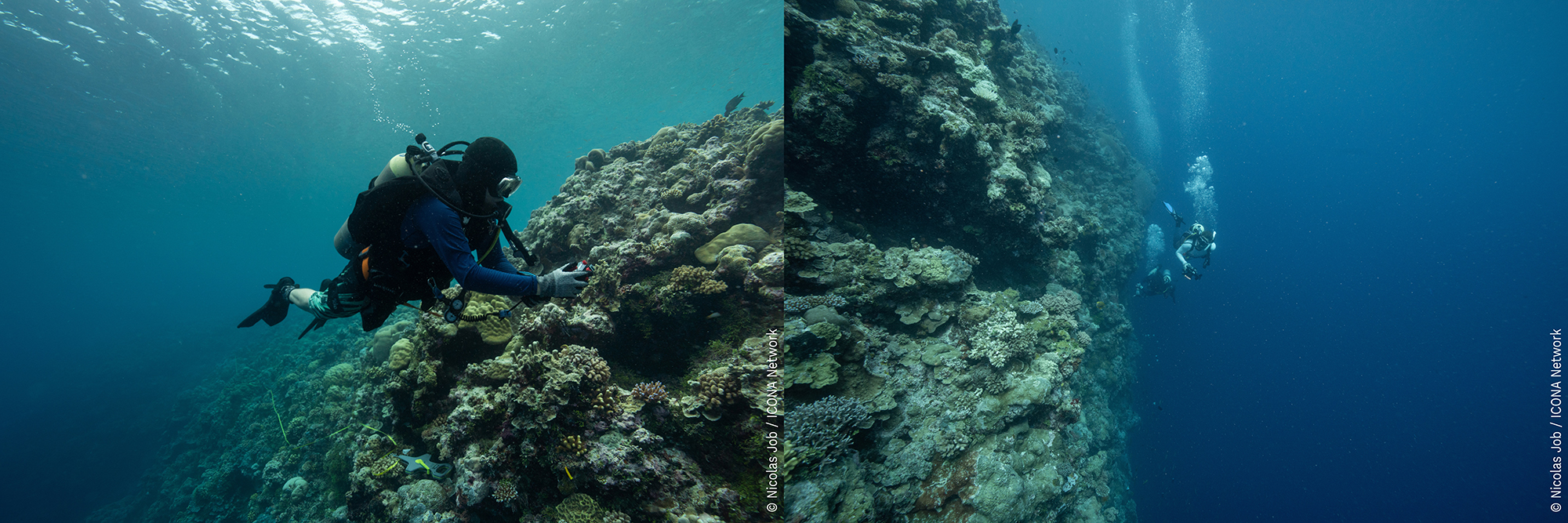
🇯🇵 🇮🇹 🇫🇷 Expedition to Palau: Sea Urchins
- April 17th - April 28th, 2023
The sea urchin team investigated the physiological and molecular responses of Diadema sp. and Echinometra sp.. The team included Dr Ben Harvey (Shimoda Marine Research Center, University of Tsukuba, Japan) and Dr Bayden Russell (SWIMS, University of Hong Kong).
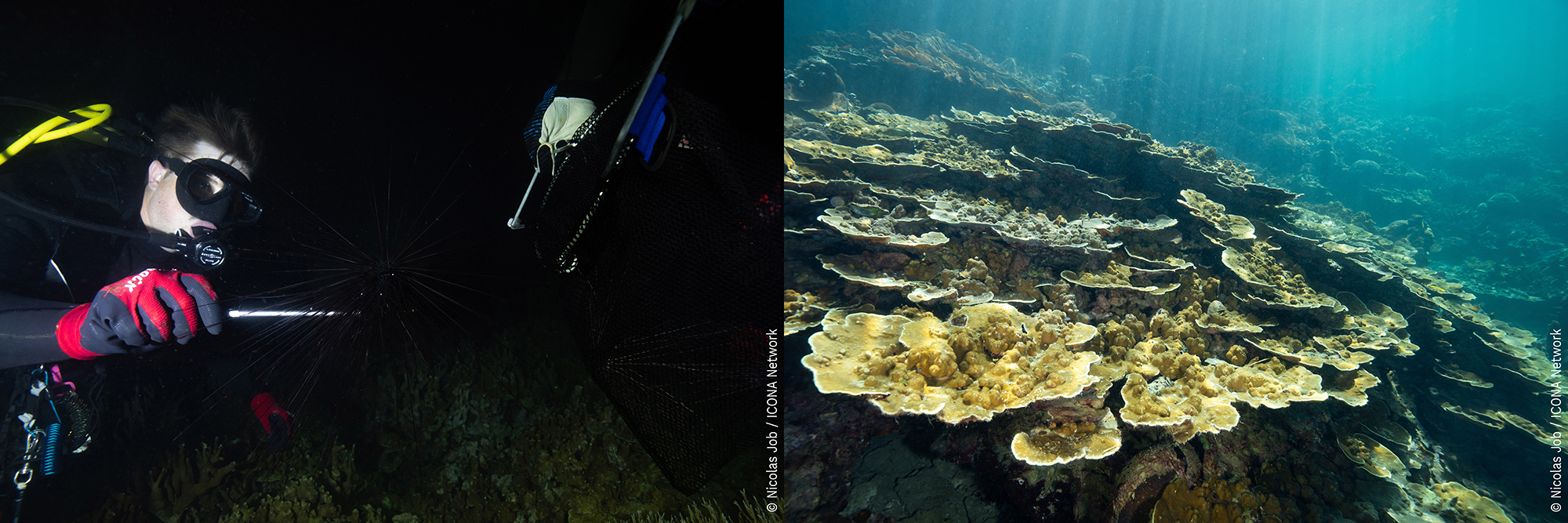
🇯🇵 🇮🇹 🇫🇷 Expedition to Palau: Corals
- April 17th - April 28th, 2023
The coral team investigated the combined effects of ocean acidification and light on a range of coral species. The team included: Dr Riccardo Rodolfo-Metalpa and Dr Fanny Houlbreque (IRD, New Caledonia), Dr Sylvain Agostini and Dr Shigeki Wada (Shimoda Marine Research Center, University of Tsukuba, Japan).
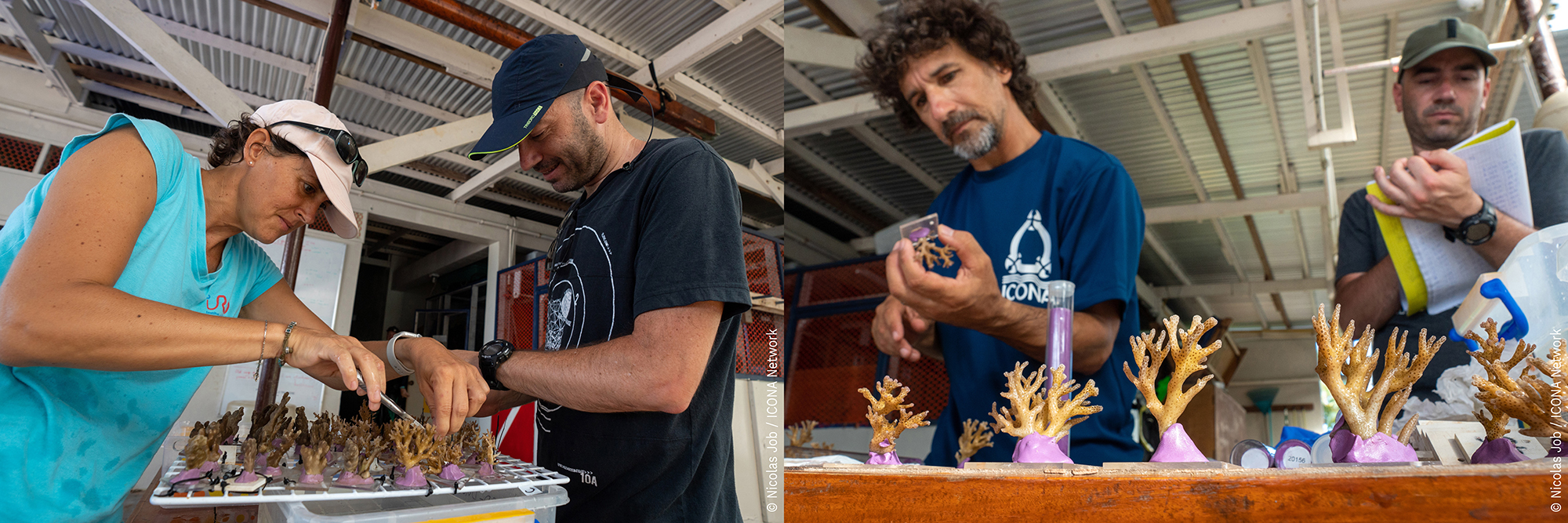
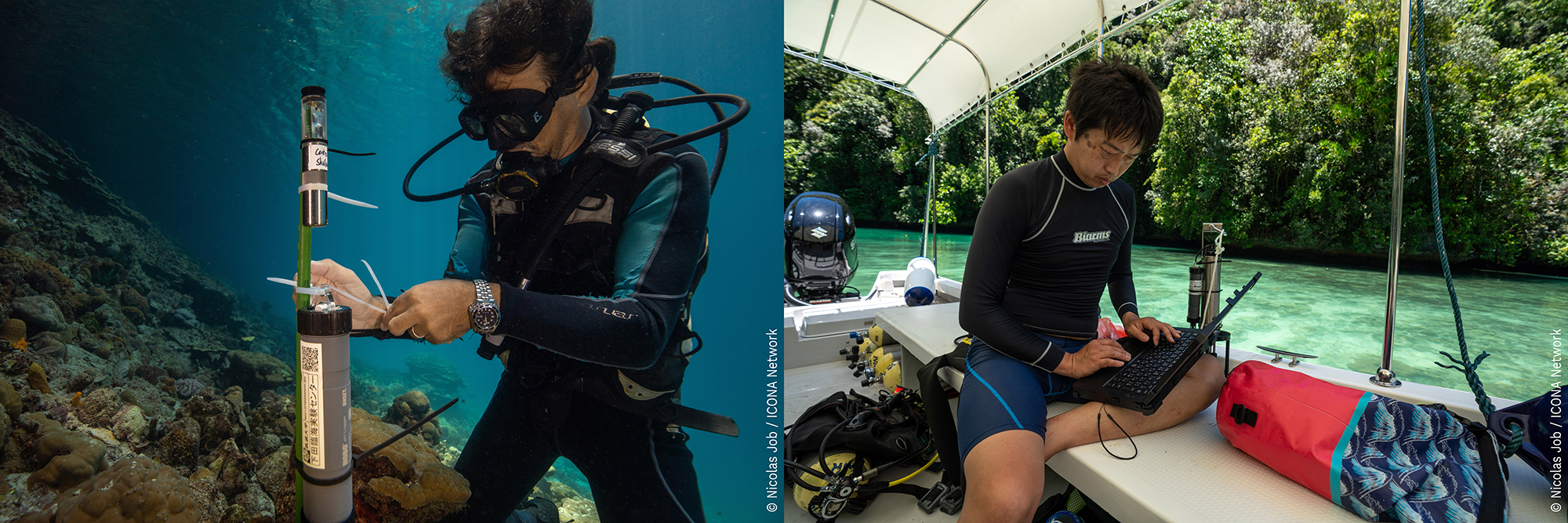
🇯🇵 🇮🇹 🇫🇷 Expedition to Palau: Fishes
- April 17th - April 28th, 2023
The fish team in Palau investigated the behavioural and molecular responses of the Pajama Cardinalfish (Sphaeramia nematoptera). The team included: Professor Marco Milazzo (University of Palermo, Italy) and Professor Timothy Ravasi (OIST, Japan), Researcher Dr Carlo Cattano (Stazione Zoologica Anton Dohrn, Italy), Post-doctoral Researcher Dr Davide Spatafora (Shimoda Marine Research Center, University of Tsukuba, Japan), PhD Student Billy Moore (OIST, Japan) and Fieldwork Technician Erina Kawai.
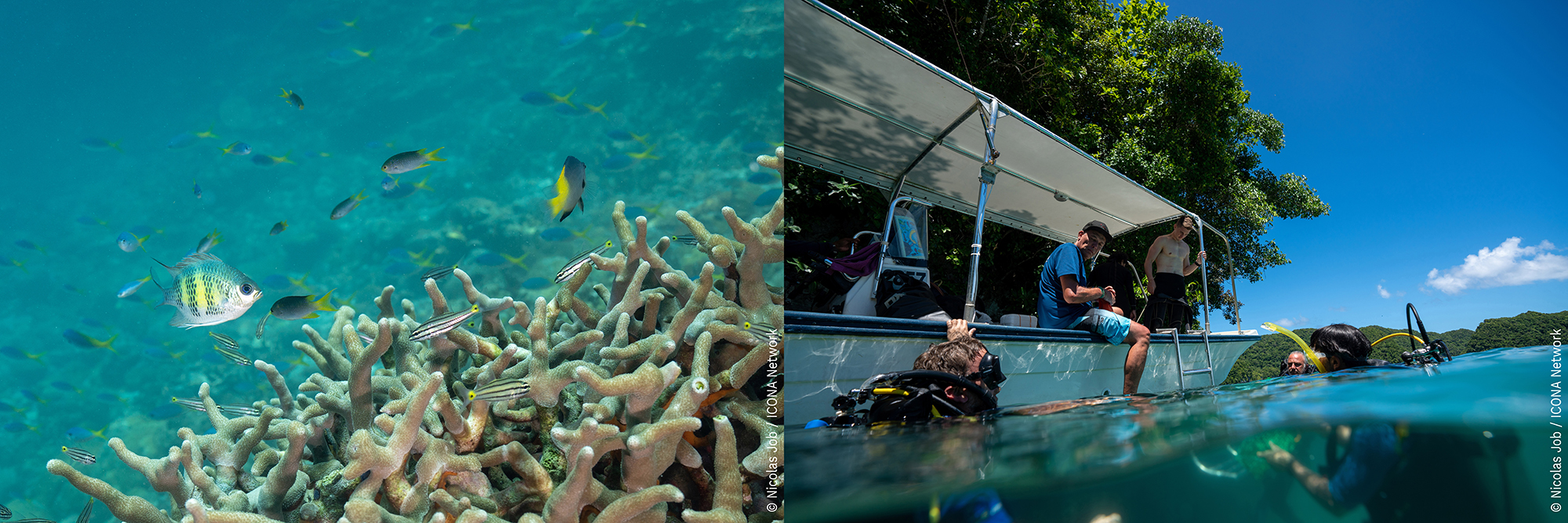
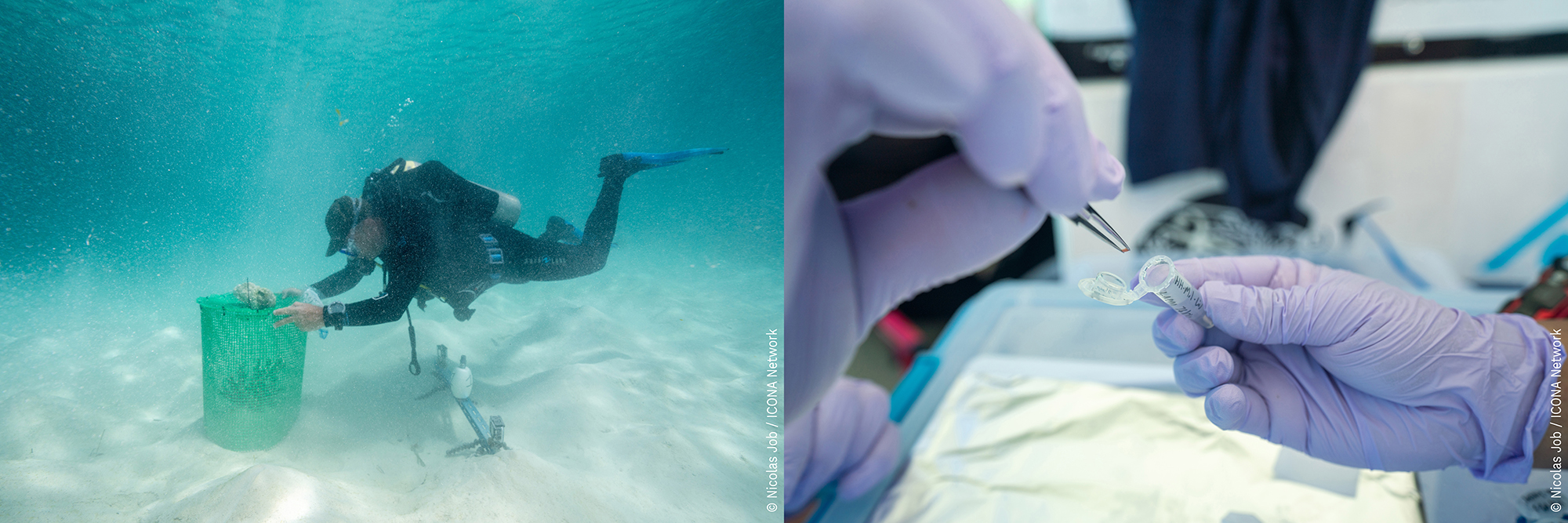
🇯🇵 🇮🇹 🇫🇷 Expedition to Palau for the ICONA Network
- April 17th - April 28th, 2023
ICONA Network members have gone to the semi-enclosed Nikko Bay in Palau (hosted by the Palau International Coral Reef Center) to investigate the effects of ocean acidification and climate change on a range of different organisms.
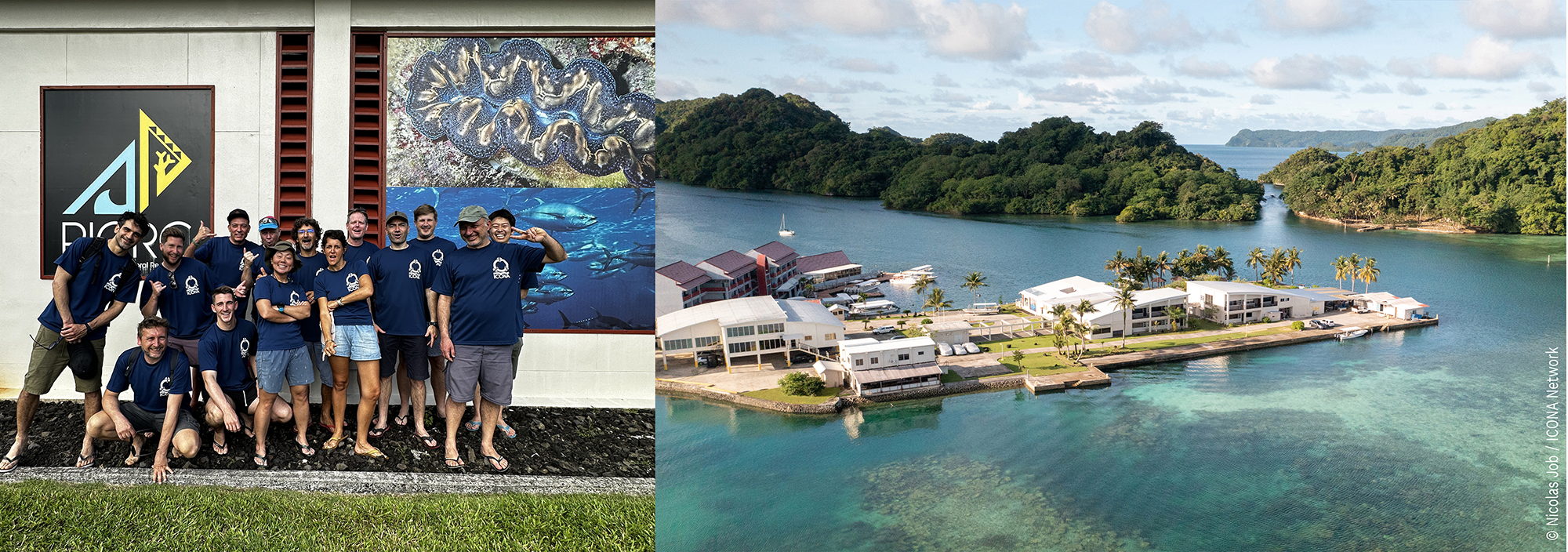
🇯🇵 🇫🇷 COP27 Side Event
- November 10th, 2022
A side event entitled: “What tools do we have to improve rapid adaptation and resilience of corals? A global approach with specific perspectives for the Pacific region” will be held as part of COP27 at 3pm on November 10th 2022 in the Moana Blue Pacific Pavillon.
The focus of the side event is as follows:
To reduce the widespread loss of coral reefs, drastic reductions in greenhouse gas emissions need to be accompanied by human interventions. We can learn from nature and existing resilience hotspots to develop and improve nature-based solutions.
The French National Research Institute for Sustainable Development (IRD) invites COP27 attendees to a side event on coral reef resilience under rapid climate change. A panel of international experts in coral reef science will discuss at the Moana Blue Pacific Pavilion which tools are currently available to accelerate coral adaptation and therefore increase coral reef resilience in the face of climate change.
Tropical coral reefs are biodiversity hotspots that provide income and resources to almost one billion people worldwide but they are also the marine ecosystem most endangered by rapid climate change. Nature-based solutions have significant potential to support coral reef adaptation to climate change and include a wide range of approaches.
This side event will focus on what we can learn from nature and existing resilience hotspots, as well as on how we can manipulate corals to improve their stress resilience. Resilience hotspots with naturally stress-resistant coral populations have recently been discovered. Although most corals are highly sensitive to heat and acidification, some already thrive under temperatures and acidity levels worse than projected in future climate scenarios. These natural analogues can therefore provide fascinating insights into the “coral reefs of tomorrow” that can be leveraged to improve coral reef conservation, management and restoration.
This side event is a collaborative project between the French National Research Institute for Sustainable Development (IRD), the ICONA consortium, the Universities of Tsukuba, and Amsterdam, the French National Centre for Scientific Research (CNRS), the King Abdullah University of Science and Technology (KAUST), the International Coral Reef Society (ICRS) the Coastal Oceans Research and Development – Indian Ocean (CORDIO), and the Prince Albert II of Monaco Foundation.
Riccardo Rodolfo-Metalpa, IRD ENTROPIE
Verena Schoepf, University of Amsterdam
Sylvain Agostini, University of Tsukuba, ICONA co-founder
Jean-Pierre Gattuso, CNRS-Sorbonne University-Iddri
Raquel Peixoto, KAUST, ICRS
David Obura, CORDIO - East Africa

🇯🇵 🇮🇹 GOA-ON Presentation
- November 2nd, 2022
Dr Davide Spatafora (on behalf of himself, Prof. Marco Milazzo and Dr Carlo Cattano) and Professor Timothy Ravasi gave a presentation on 'Molecular basis and behavioural adjustments reveal potential local adaptation to acidifying oceans, a lesson from natural analogues' as part of the GOA-ON Webinar series.
A recording of the presentation is available on youtube: https://youtu.be/-N4-gA2ZA9I
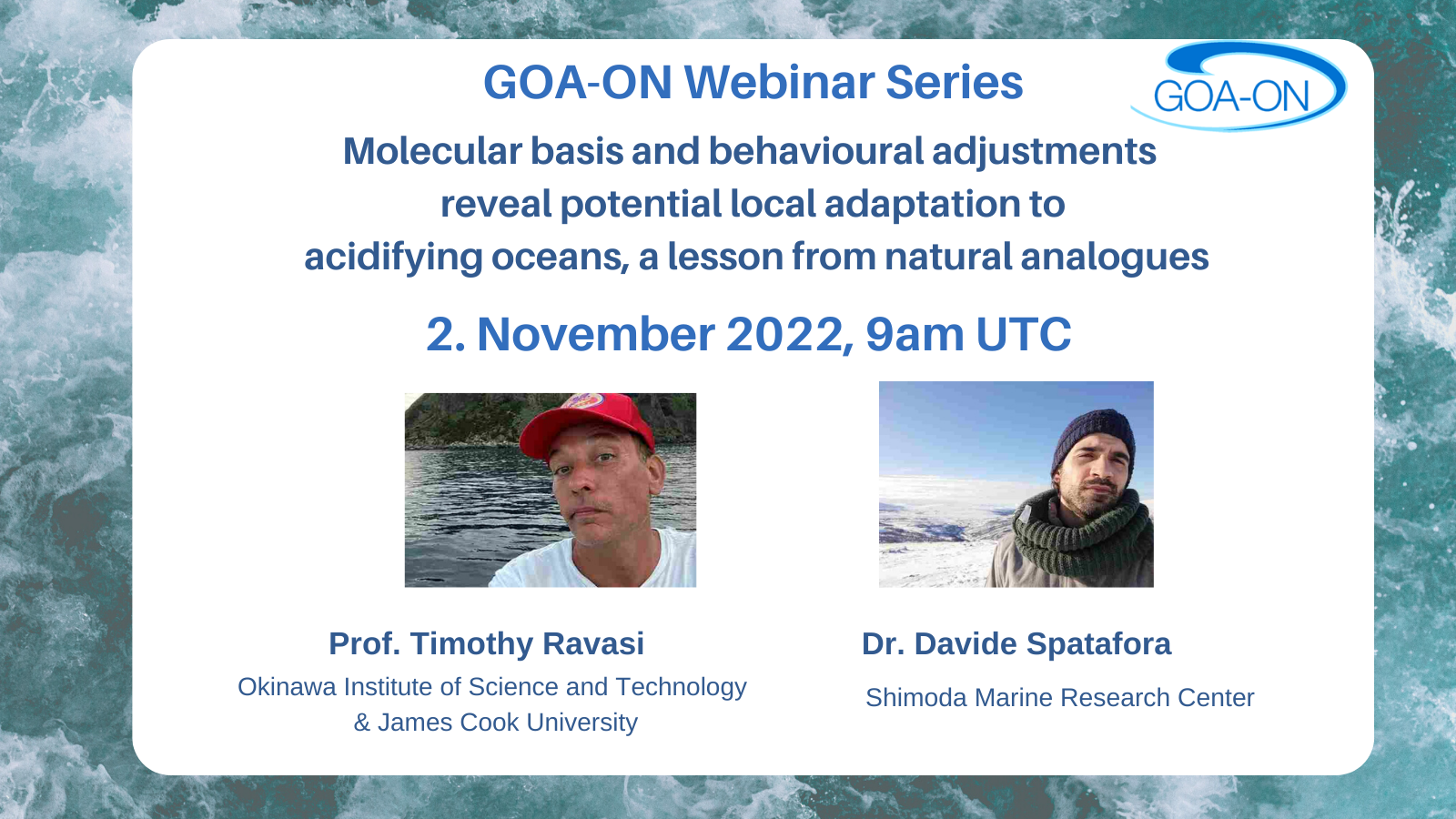
🇯🇵 🇫🇷 GOA-ON Presentation
- July 21st, 2022
Assistant Professor Sylvain Agostini (on behalf of himself, Dr. Riccardo Rodolfo-Metalpa and Prof. Haruko Kurihara) and Associate Professor James D. Reimer gave a presentation on 'What natural analogues can teach us about the future of coral communities and their understudied biodiversity' as part of the GOA-ON Webinar series.
A recording of the presentation is available on youtube: https://youtu.be/9sYLLf8Lhi0
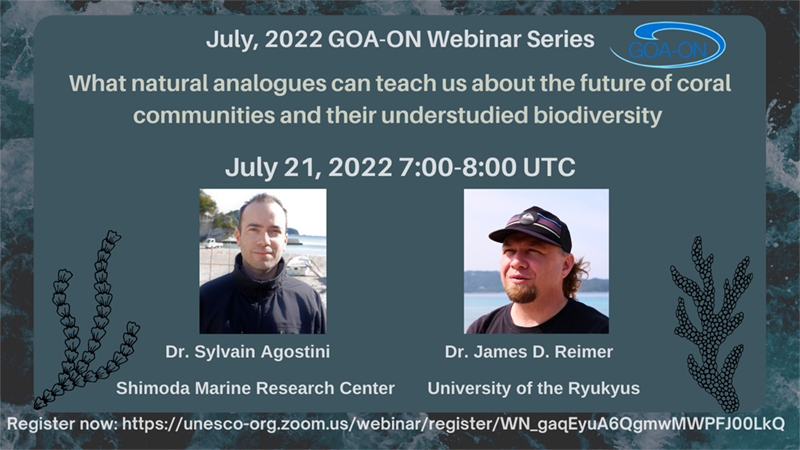
🇯🇵 Visit to Ischia for members of the Japanese Core
- June 9th - July 3rd, 2022
Assistant Professors Shigeki Wada and Lucia Porzio have gone to Ischia in Italy (hosted by Dr Marco Munari from Stazione Zoologica Anton Dohrn, Italy) to examine changes in the production of macroalgal communities in response to ocean acidification at the Ischia CO2 seeps.
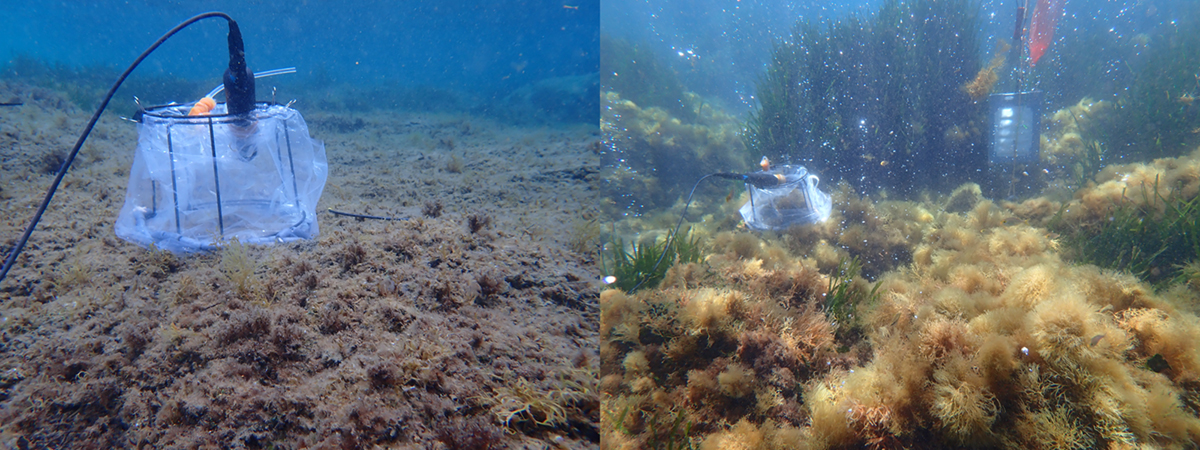
🇯🇵 Visit to Bouraké for members of the Japanese Core
- June 12th - June 26th, 2022
Assistant Professor Ben Harvey and post-doctoral researcher Davide Spatafora have come to Bouraké on New Caledonia (hosted by Dr Riccardo Rodolfo-Metalpa from IRD, New Caledonia) to examine community dynamics and fish behaviour, respectively, in response to altered environmental conditions.
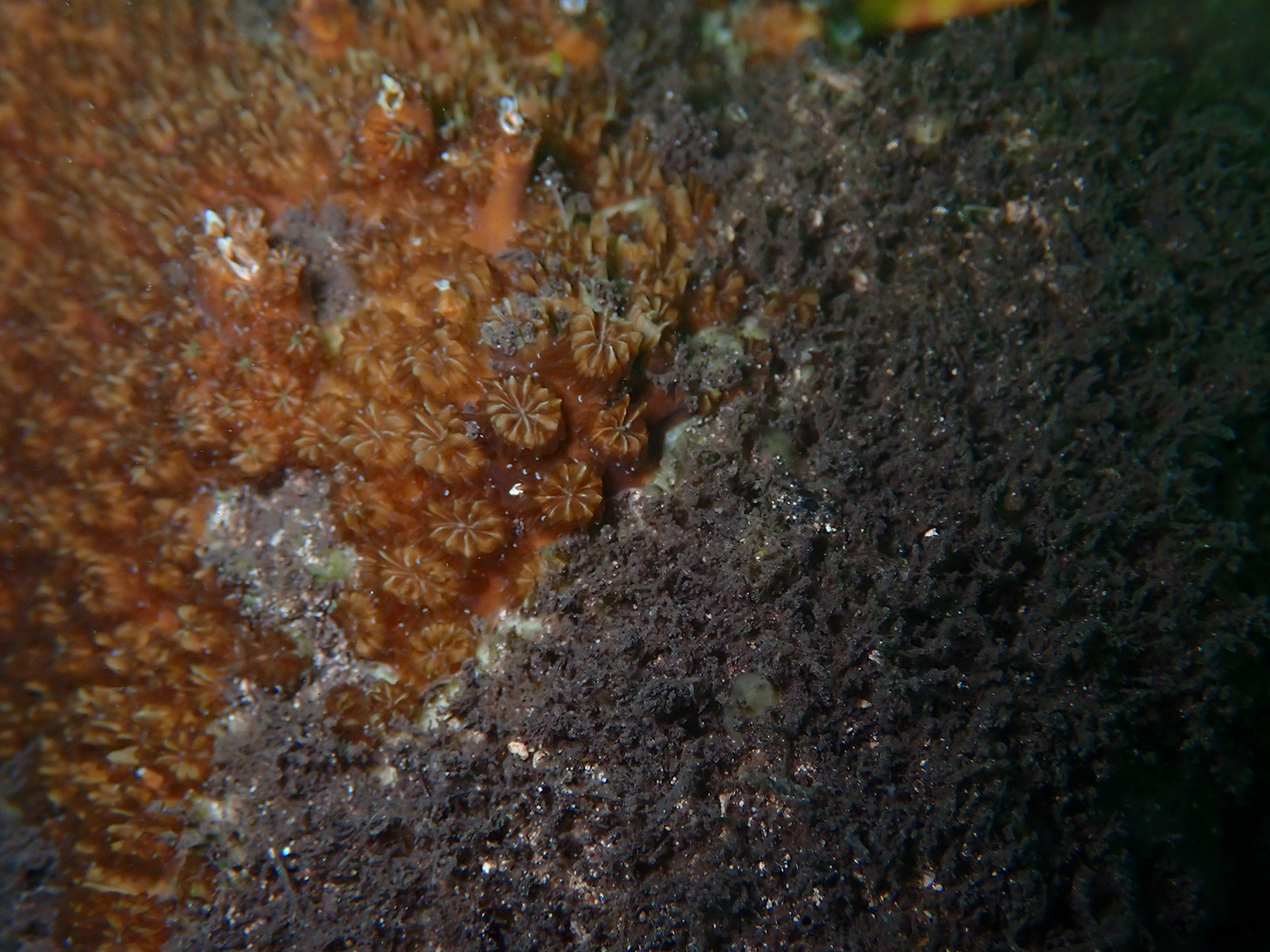
🇯🇵 Visit to Bouraké for members of the Japanese Core
- June 12th - June 26th, 2022
Associate Professor James Reimer has come to Bouraké on New Caledonia (hosted by Dr Riccardo Rodolfo-Metalpa from IRD, New Caledonia) to examine understudied coral reef benthos and their symbionts
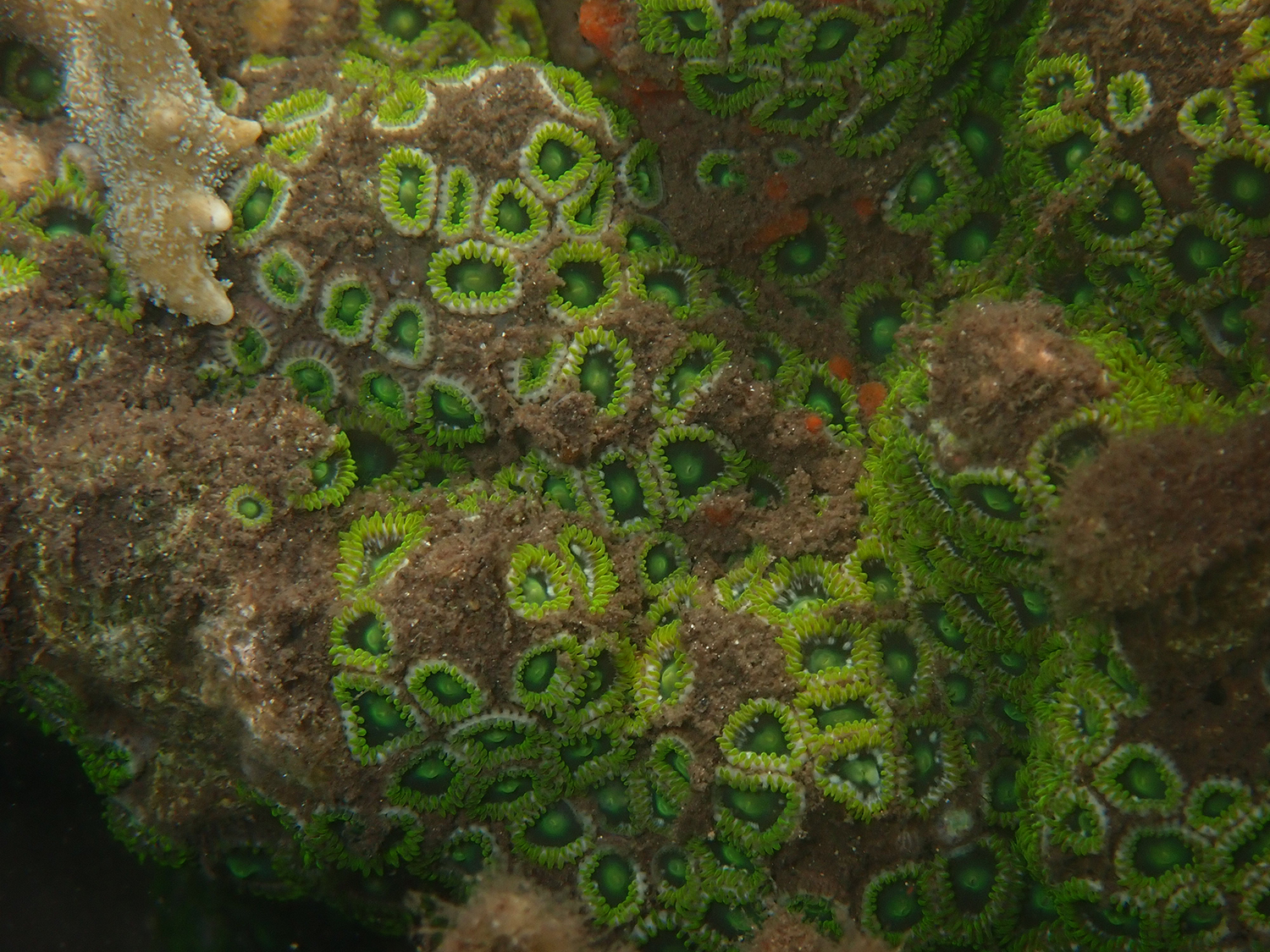
🇯🇵 Visit to Bouraké for members of the Japanese Core
- June 12th - June 26th, 2022
Professor Tim Ravasi, PhD Students Michael Izumiyama and Billy Moore, Research Unit Scientific Diver, Erina Kawai, and Research Unit Technician, Hiroki Takemiyagi, from the Marine Climate Change Unit of the Okinawa Institute for Science and Technology (OIST) have come to Bouraké on New Caledonia (hosted by Dr Riccardo Rodolfo-Metalpa from IRD, New Caledonia) to collect fishes from the reference and elevated pCO2 sites to investigate how marine fishes respond to altered environmenal conditions.
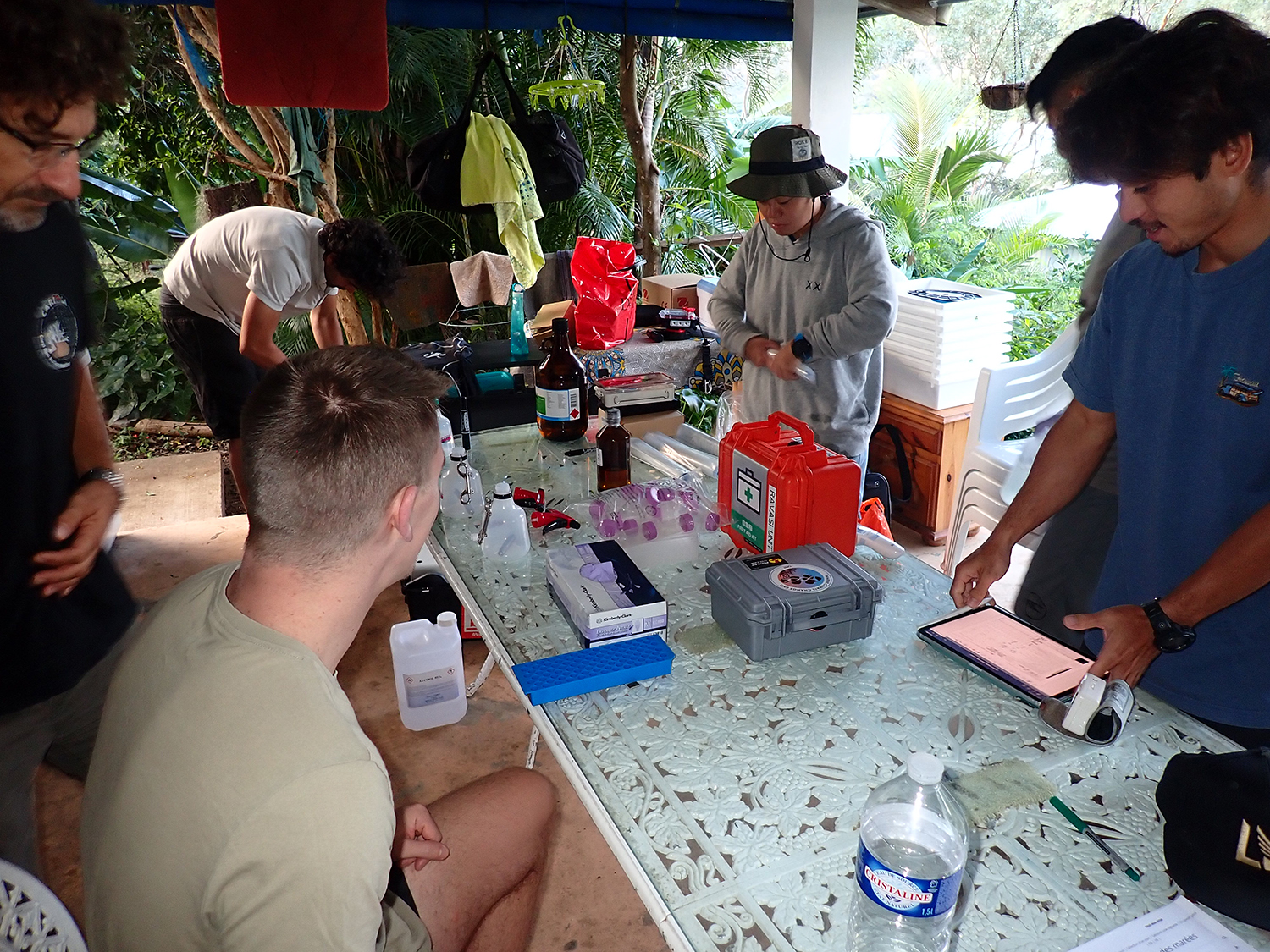
🇯🇵 Visit to Shikine for members of the Japanese Core
- May 30th - June 3rd, 2022
Assistant Professor Sylvain Agostini and lab members (PhD student Joshua Heitzman, MSc students Guinther Mitsuhashi and Ryohei Teika, and 4th year Layla Iijima), as well as post-doctoral research Davide Spatafora, from the Shimoda Marine Research Center, University of Tsukuba have gone to Shikine Island to study the response of corals and fishes to ocean acidification.
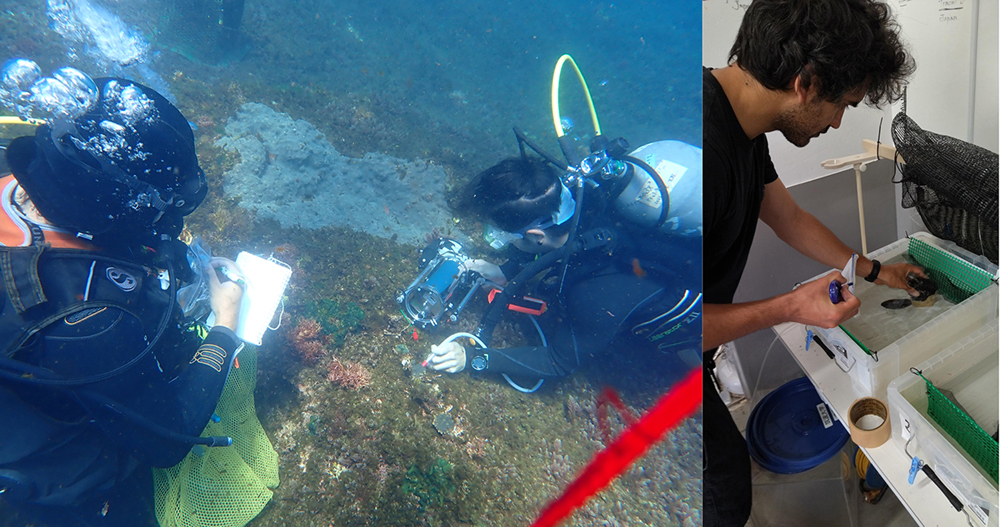
🇯🇵 Visit to OIST for members of the Japanese Core
- Nov 1, 2021
Assistant Professor Ben Harvey has visited the Marine Climate Change Unit of the Okinawa Institute for Science and Technology (OIST) to give a seminar on his CO2 seep research from Shikine Island. Alongside MSc Student Guinther Mitushasi, they also made use of the Micro-CT Scanner in order to investigate how the calcified structure of organisms (including the mussel Septifer bilocularis) is affected by ocean acidification.
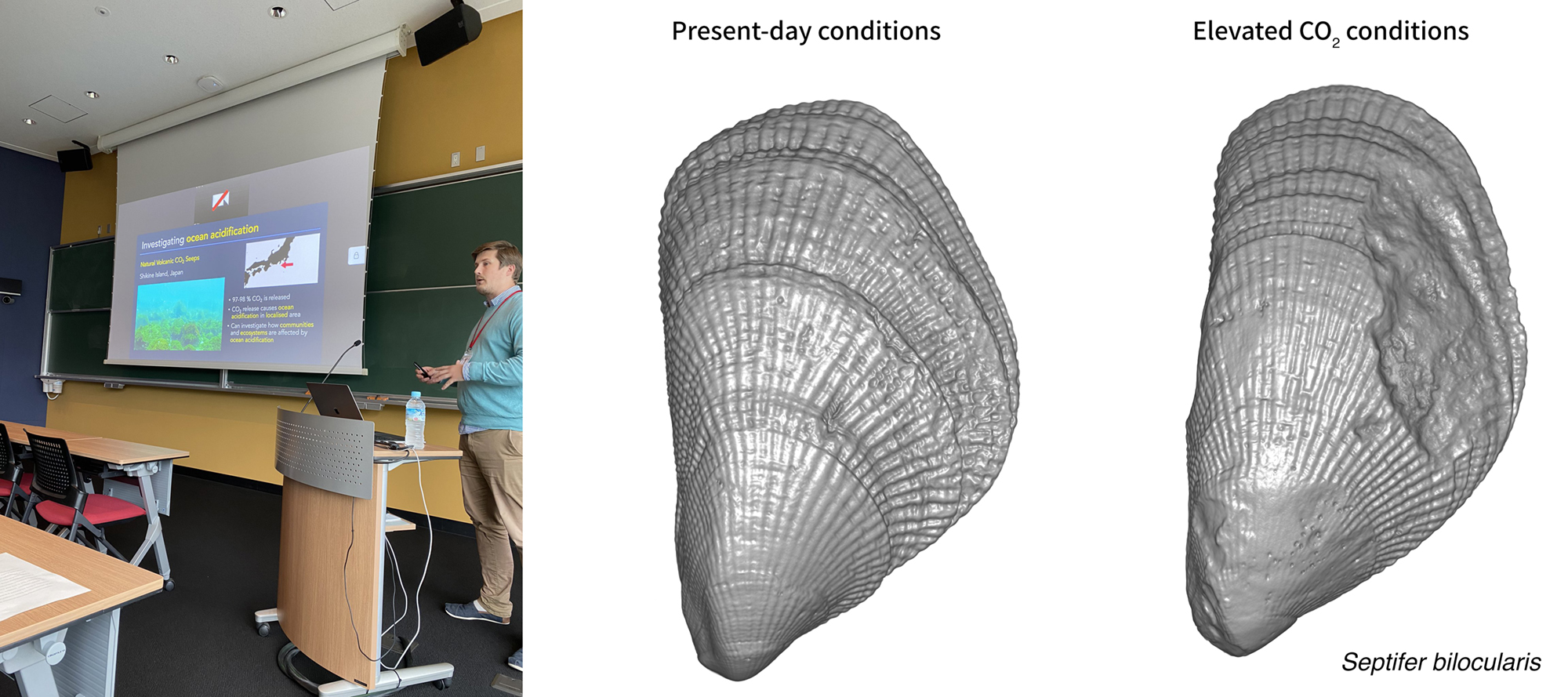
🇯🇵 Research Trip in Shikine Island CO2 Seep for the Japanese Core
- Nov 1, 2021
PhD Student Michael Izumiyama, Research Unit Scientific Diver, Erina Kawai, and Research Unit Technician, Jeff Jolly, from the Marine Climate Change Unit of the Okinawa Institute for Science and Technology (OIST), supervised by Professor Tim Ravasi, have come to Shikine Island again to collect additional fishes from the reference and elevated pCO2 sites to investigate how marine fishes respond to ocean acidification.
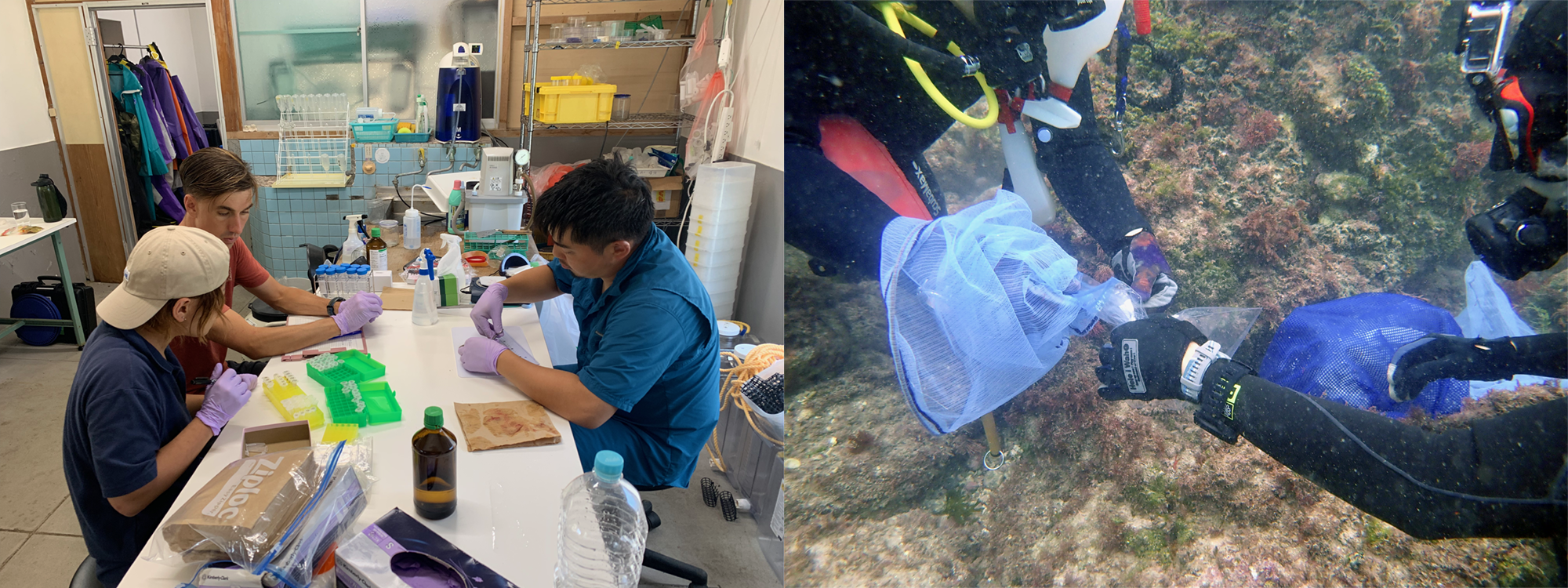
🇯🇵 🇫🇷 🇮🇹 ICONA-JSPS Kick-Off Symposium
- July 8, 2021
The kick-off symposium for the ICONA network held yesterday was a great success - Many thanks to both our speakers and the participants!
The title slides of the talks are shown in the image below, and the talks are being uploaded to our ICONA Network Channel on Youtube.
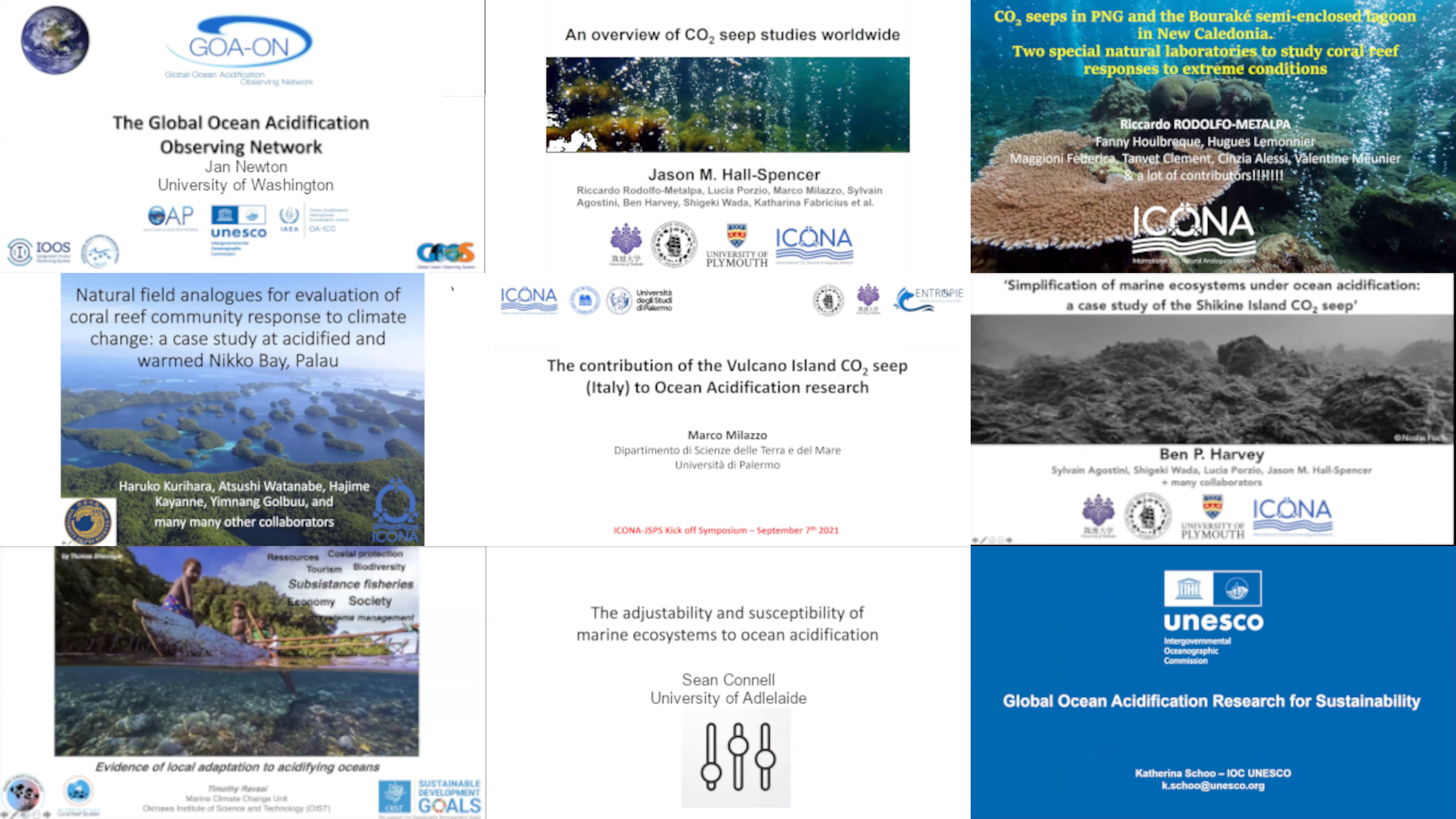
🇯🇵 🇫🇷 🇮🇹 ICONA-JSPS Kick-Off Symposium
- July 7, 2021
During the Tsukuba Global Science Week (TGSW), the ICONA network will be having a kick-off symposium. Presenters from the ICONA Network, as well as representatives from the Global Ocean Acidification Observing Network (GOA-ON) and the Intergovernmental Oceanographic Commission (IOC) of UNESCO will be giving presentations. See the poster below for more details, or visit the TGSW website here.
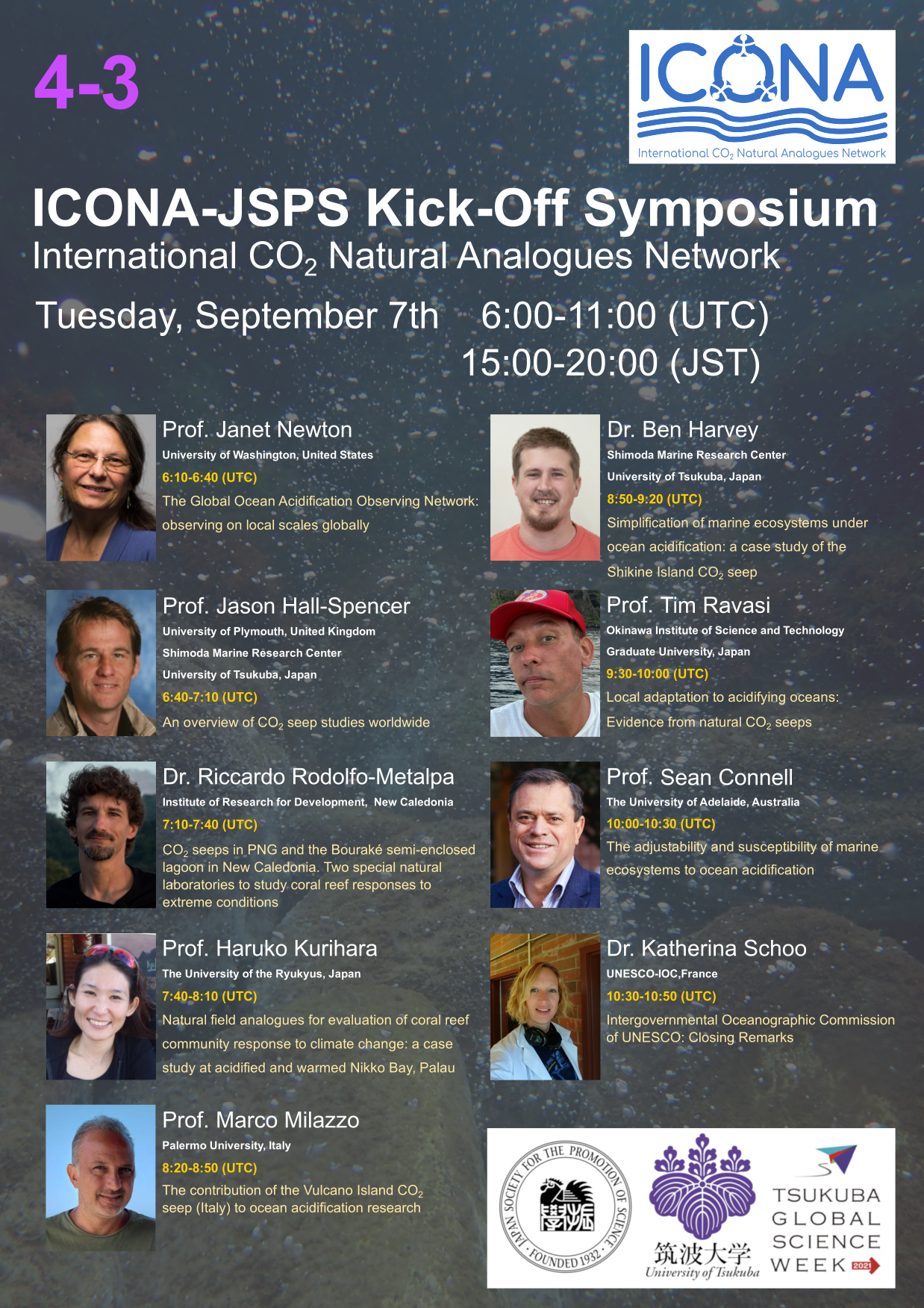
🇯🇵 Research Trip in Shikine Island CO2 Seep for the Japanese Core
- July 3, 2021
Associate Professor Dr James Reimer and Master's Student Emmeline Jamodiong from the University of the Ryukyus have been collecting soft corals and zoanthids from the reference and elevated pCO2 sites of Shikine Island to investigate their systematics and ecology, and to assess how they respond to ocean acidification.
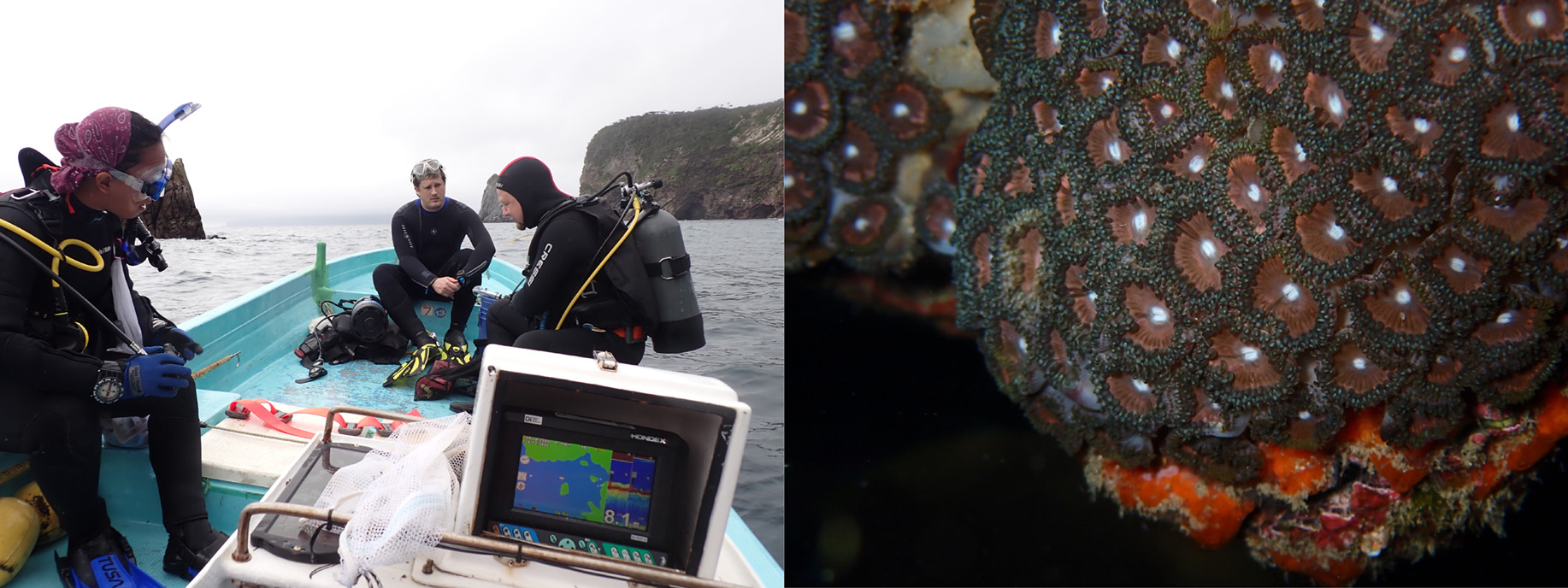
Post-Doctoral Researcher Dr Manon Mercader from the Marine Eco-Evo-Devo Unit of the Okinawa Institute for Science and Technology (OIST), supervised by Professor Vincent Laudet, has been collecting fishes from around Shikine Island to investigate the role of hormones in the evolution of life history characteristics in fish.
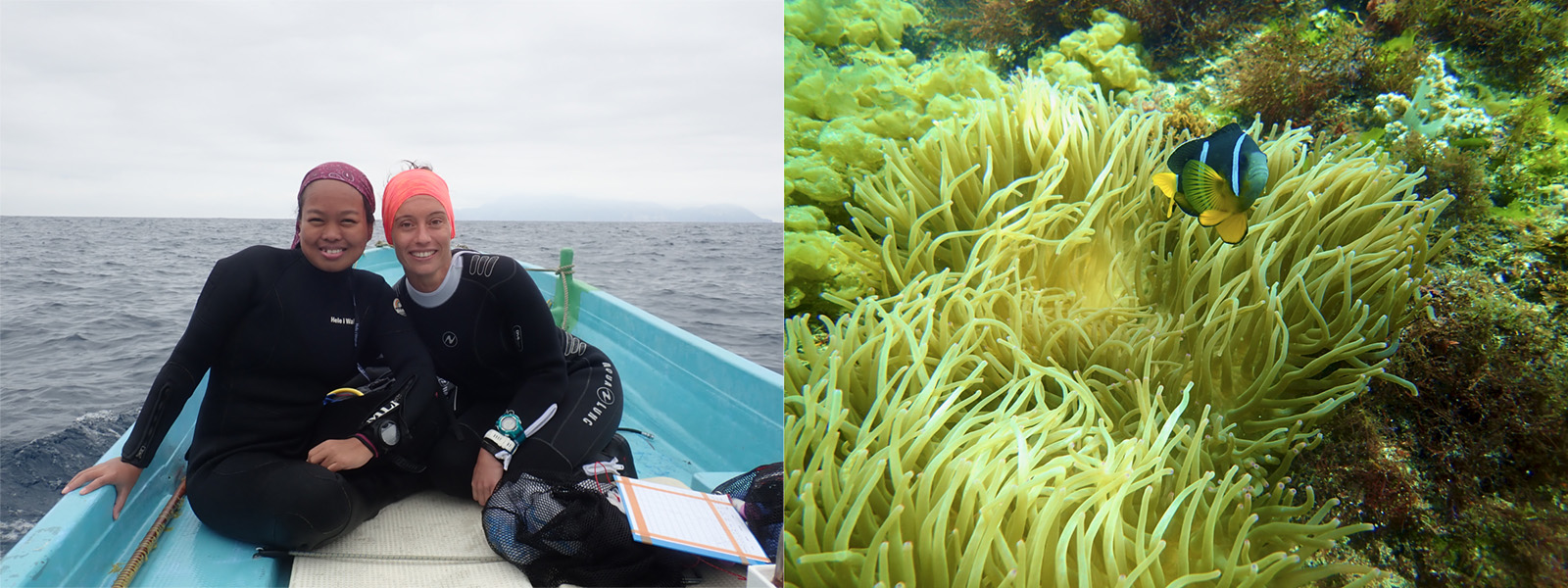
PhD Student Michael Izumiyama, Research Unit Scientific Diver, Erina Kawai, and Research Unit Technician, Jeff Jolly, from the Marine Climate Change Unit of the Okinawa Institute for Science and Technology (OIST), supervised by Professor Tim Ravasi, have been collecting fishes from the reference and elevated pCO2 sites to investigate how marine fishes respond to ocean acidification.
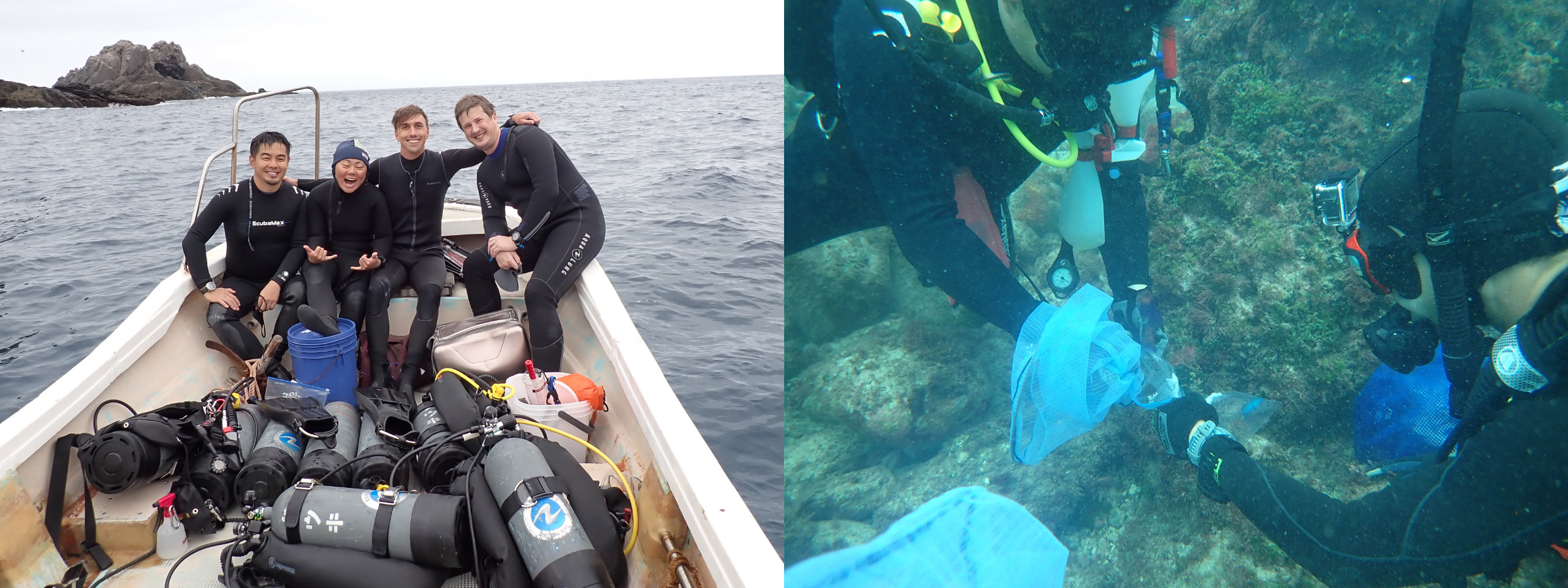
🇯🇵 Research Trip to Shikine Island CO2 Seep for the Japanese Core
- June 29, 2021
Researchers and students from the the Okinawa Institute for Science and Technology (OIST) and the University of the Ryukyus joined researchers from the Shimoda Marine Research Center, University of Tsukuba for a research trip to Shikine Island CO2 seep.
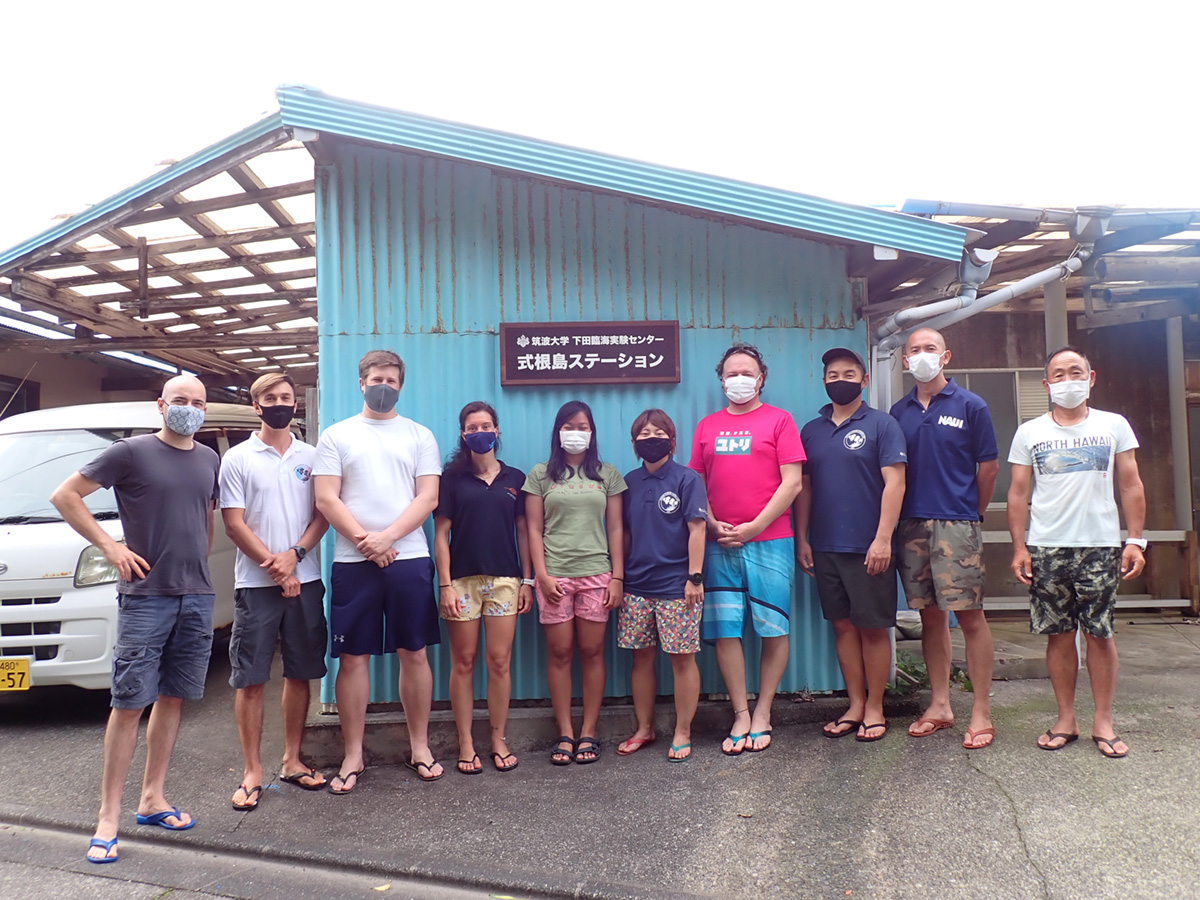
🇯🇵 Research Seminar at the Shimoda Marine Research Center, University of Tsukuba
- June 28, 2021
Professor Vincent Laudet from the Okinawa Institute for Science and Technology (OIST) gave a research seminar on 'Coral reef fishes: great models for Eco-Evo-Devo'. The talk described the research of the group which uses the extraordinary diversity of coral reef fish to better understand the role of hormones in the evolution of life history strategies, in a perspective integrating ecological, evolutionary and developmental components.
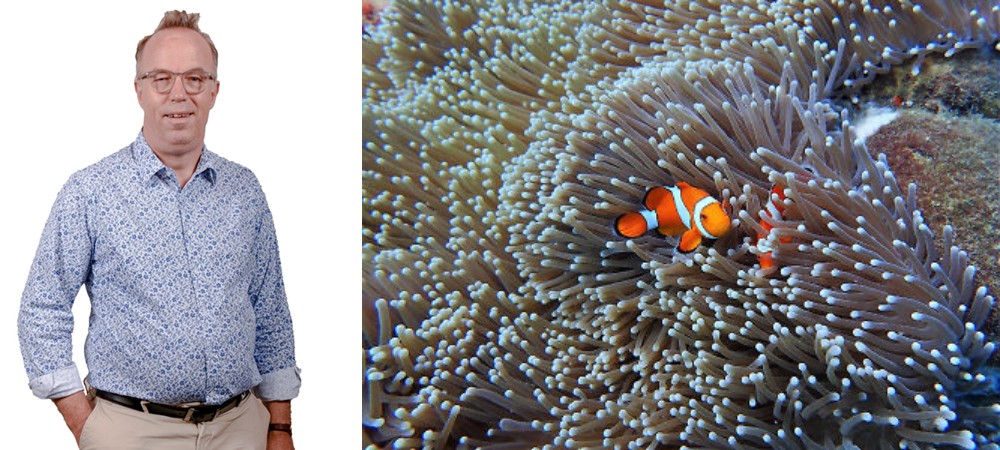
Project Officially Starts!
- April 1, 2021
The ICONA project has now officially started and will be running from 2021 until 2026. The project aims at facilitating innovative research on the ecosystem-level effects of ocean acidification using natural analogues.
Initial Meeting of the Japanese Core
- March 22, 2021
The Japanese Core Members had a meeting to discuss the start of the project, including the planning of future research activities.
The three core aims of the network were discussed:
- Facilitate research using natural analogues for ocean acidification through capacity building
- Assess the impact of ocean acidification on marine ecosystems using multiple natural analogues and possible adaptation strategies
- Promote data exchange and the dissemination of findings